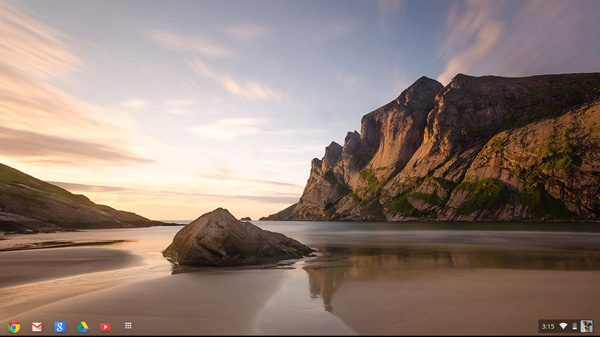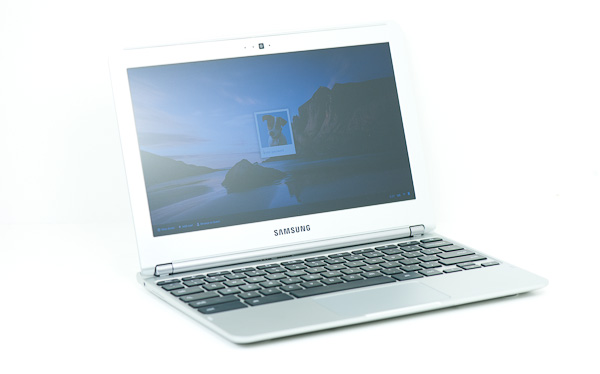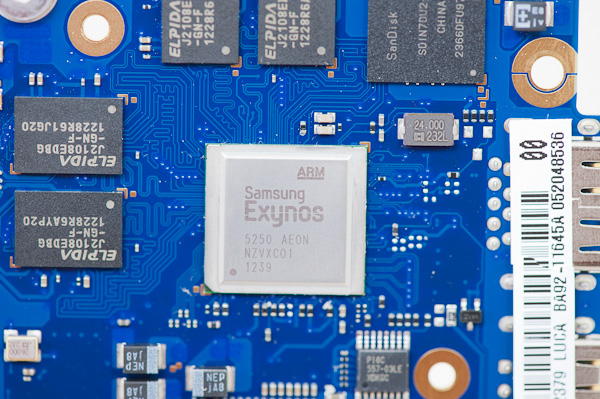Samsung Chromebook (XE303) Review: Testing ARM's Cortex A15
by Anand Lal Shimpi on October 31, 2012 9:00 AM ESTGoogle announced the Chrome OS project two years ago, and with it came the first Chromebook: the CR-48. The Chrome OS concept seemed revolutionary at the time. In 2010 we were well into the latest round of questioning whether today's PCs were fast enough. The Ultrabook revolution hadn't yet begun, and the iPad was starting to gain momentum. Capitalizing on the market being flooded with poor quality, yet affordable PC notebooks that still struggled with the same virus/malware issues they'd been facing for years, Google took the opportunity to attempt to revolutionize the PC OS.
Chrome OS was that attempt at a revolution. As an OS built around a web browser, Chrome OS offered many of the advantages that the Chrome browser itself brought to the table: sandboxing, guest mode and constant/painless updates. All user data is encrypted on the drive by default. Security was and remains a major feature of Chrome OS.
Google's revolution extended to hardware as well. The Cr-48 notebook delivered a good keyboard, trackpad and solid state storage. Future Chromebooks would do the same. While the price points of these machines (<$500) kept ultra high resolution IPS displays out of the bill of materials, Google promised good build quality and solid state storage - two things you couldn't find in cheap notebooks of the time.
Since then, some of the traditional PC makers have woken up. Although confined to the $999+ price point, we're finally seeing attention paid to build quality, display quality and storage performance. Over the next couple of years there's going to be increased focus on bringing those premium features down to sub $700 price points.
For Chrome OS and Google's Chromebooks to remain relevant, they also had to move down the pricing stack. With its most recent announcement, Google has done just that. The new Chromebook (Samsung XE303C12) is priced at $249, while maintaining much of what made its predecessors interesting.
Even more interesting than its aggressive price point is the choice of SoC inside Google's new Chromebook: Samsung's Exynos 5 Dual, featuring two ARM Cortex A15 CPU cores. This move makes the new Chromebook the very first non-x86 machine to ship with Chrome OS. Given that I also happen to have a dual-core Atom based Chromebook from 2011, the new Exynos 5 based machine gave me a unique opportunity to get a preview of how ARM's next-generation CPU core would stack up against Atom.













149 Comments
View All Comments
jeffkro - Friday, November 2, 2012 - link
You do realize there is a higher end chromebook that runs on a ULV celeron cpu right. If you want better specs it is available.jeffkro - Friday, November 2, 2012 - link
The celeron runs windows pretty fast so you know its lighting fast for chrome OS.agnar150 - Saturday, November 3, 2012 - link
You could not be more wrong. The OS structure is inherently more secure and it is very much more secure than Windows.Wolfpup - Friday, November 2, 2012 - link
How is Windows not safe? I've been using it how long now? Decades? And had exactly zero security intrusions. Being the market leader so you're a big target doesn't mean the platform is less safe-in fact Microsoft takes security a lot more seriously than most closed source software does.As for this unit...it remains ridiculous. I bought a $200 Acer running real Windows 7 on AMD hardware, and it's obviously a bajillion times more functional. This thing runs one single program-Chrome, on low end hardware, doesn't properly support external displays or other devices, can't replace my real PC for...much of anything, and it actually costs as much or more than superior devices...just like the older Chromebooks did.
epobirs - Friday, November 2, 2012 - link
Utter nonsense. There are tons of options for locking down Windows the average consumer doesn't bother with but the information is widely available. Just a few changes makes it far harder for malware to get any value from the machine.The difference is that you still have the full capabilities of Windows and its software library, along with a choice of browsers, including Google Chrome.
The people I know who do serious online financial work wouldn't blink at spending a lot more than $250 to pay someone like me to teach them to lock down their machine for work. Putting up with the limitations of Chrome OS and paying for the privilege would strike them as absurd.
UltraTech79 - Friday, November 16, 2012 - link
"People that do online investing and banking with significant assets" have better options than shitty chrome OS or standard windows. Ridiculous.ddriver - Wednesday, January 9, 2013 - link
Have you actually checked the chrome store? there are plenty of good applications, especially concerning productivity, surely, the overall number of apps is much lower than android, but considering most of those are useless, it is not that big of a deal. You can do plenty of stuff on the chromebook, and that that price point it is a very good bargain.Flunk - Wednesday, October 31, 2012 - link
No, honestly it doesn't. If you need a keyboard you buy one of the ASUS Transformer pads. This is a very limited device that won't get you very far and really doesn't have a reason for existing. If this was just a laptop-like device running android I could see the utility but Chrome OS is basically just a kneecapped version of android.jeffkro - Wednesday, October 31, 2012 - link
Its kneecapped for security, their is a reason for it.klmccaughey - Thursday, November 1, 2012 - link
I would totally agree with this if there was an android with a keyboard and this hardware at this price point. The transformer is good, but it's far too expensive.I got an Ipad 2 by accident, and between that and the laptop I don't think I need anything else. I hate Apple, which makes the whole experience confusing.